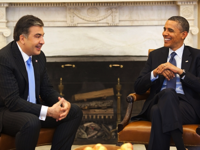The Oval Office meeting between U.S. President Barack Obama and Georgian President Mikheil Saakashvili on Jan. 30 has already been chalked up as a major victory by Tbilisi. Obama and Saakashvili discussed a range of topics, including the development of Georgia’s democracy, the country’s future transition of power and a possible free trade deal. For the Georgian government and their allies in the media, however, increased defense ties were the centerpiece development. Yet aside from an oblique reference by Saakashvili to “elevating our defense cooperation further,” details on any changes in the military relationship have been scarce.
Several figures in Saakashvili’s government, including the president himself, have described the talks as constituting a “new level” of defense cooperation, but have refrained from elaborating. And other than references to Georgia’s generous contribution to ongoing military operations in Afghanistan, U.S. officials have been even more coy about the extent of current cooperation and what might be meant by taking it to a new level.
By far the most visible issue surrounding recent U.S.-Georgia defense relations has been that of arms sales, which the U.S. discontinued after Georgia’s tiny military was routed by Russia in the 2008 war between the two countries. Fearing another Russian invasion, Georgian officials have aggressively lobbied Washington to restart arms sales -- particularly of advanced anti-aircraft and anti-armor systems -- to better counter Russia’s overwhelming military advantage. But in the waning days of the George W. Bush administration, the U.S. and Georgia signed a strategic partnership charter that clearly favored a “brains before brawn” approach to defense cooperation, focusing on improving operational issues within the Georgian military rather than weapons sales. And despite a bill in the U.S. Congress advocating for renewing arms sales to Tbilisi, there is little evidence that the White House intends to take that route.

